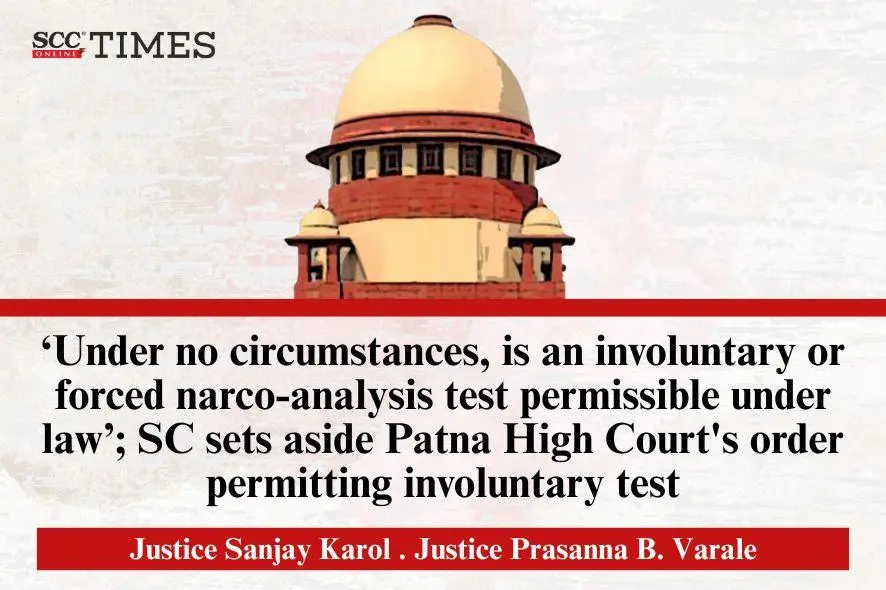Supreme Court: In a criminal appeal against Patna High Court’s decision, which had allowed narco-analysis testing of accused persons during an ongoing criminal investigation, the Division Bench of Sanjay Karol and Prasanna B. Varale, JJ. held that compelling an accused to undergo such a test without free consent violates their fundamental rights under Articles 20(3) and 21 of the Constitution.
Reaffirming its decision in Selvi v. State of Karnataka, (2010) 7 SCC 263, the Court reiterated that involuntary administration of narco-analysis tests is unconstitutional and any information obtained therefrom cannot be used as evidence.
Background
The case arose from an FIR lodged alleging dowry harassment and disappearance of the complainant’s sister, who was married to the accused/ appellant. The Patna High Court, while hearing the present appellant’s bail plea, accepted a submission from the Investigating Officer that narco-analysis tests would be conducted on all accused and witnesses. The appellant challenged this direction before the Supreme Court, citing constitutional protections and prior precedents, especially the Selvi which deemed such involuntary tests impermissible.
Analysis and Decision
Involuntary Narco-Analysis Tests Are Unconstitutional
The Court held that the direction for narco-analysis without consent was clearly unconstitutional. Relying on Selvi (supra), the Bench reiterated that involuntary tests violate both the right against self-incrimination under Article 20(3) and the right to life and personal liberty under Article 21. The High Court’s order was called contrary to the established principles of bail jurisprudence under Section 439 of the Code of Criminal Procedure, 1973 (CrPC).
The Court emphasised that a bail hearing is not the stage to order investigative techniques, particularly ones that intrude upon fundamental rights.
Voluntary Narco-Analysis Reports Cannot Alone Establish Guilt
The Court held that even when narco-analysis tests are administered voluntarily, their results cannot form the sole basis of conviction. Relying on Vinobhai v. State of Kerala, 2025 SCC Online SC 178 and Manoj Kumar Soni v. State of M.P., 2023 SCC OnLine SC 984, the Court noted that although disclosure statements hold significance as a contributing factor in unriddling a case, in our opinion, they are not so strong a piece of evidence sufficient on its own and without anything more to bring home the charges beyond reasonable doubt.
The Court clarified that only those facts discovered post-test, corroborated through Section 27 of the Evidence Act, 1872, may have evidentiary value and even then, cannot stand alone to prove guilt.
No Indefeasible Right to Demand Narco-Testing
On the issue of whether an accused can demand such a test, the Court clarified that while a person may volunteer for a narco-analysis test at the stage of defence evidence (under Section 233 CrPC), there is no absolute or indefeasible right to such testing. The court concerned must evaluate the voluntariness, safeguards, and overall context before permitting it.
The accused has a right to voluntarily undergo a narcoanalysis test at an appropriate stage. We deem it appropriate to add that the appropriate stage for such a test to be conducted is when the accused is exercising his right to lead evidence in a trial. However, there is no indefeasible right with the accused to undergo a narcoanalysis test.
The Court reiterated the Selvi guidelines, mandating that consent be informed, recorded before a magistrate, and undertaken with medical, legal, and procedural safeguards.
Decision
Setting aside the High Court’s interim order, the Court concluded that any direction to conduct forced narco-analysis is unconstitutional. Hence, the impugned decision was set aside. The bail application of the appellant was directed to be decided afresh in accordance with law.
[Amlesh Kumar v. State of Bihar, 2025 SCC OnLine SC 1326, Decided on: 09-06-2025]




